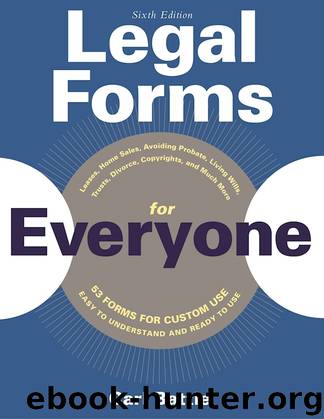Legal Forms for Everyone by Carl Battle

Author:Carl Battle
Language: eng
Format: epub
Publisher: Allworth Press
Published: 2017-03-01T05:00:00+00:00
WHAT A CREDIT REPORT COVERS
Contrary to myth, a credit bureau neither tracks all aspects or your personal life nor evaluates credit applications. Credit bureaus are simply organizations that collect and transmit four principal types of information.
Identification and employment data: Your name, birth date, address, Social Security number, employer, and spouse’s name are routinely noted. The bureau also may provide other information, such as your employment history, home ownership, income, and previous address, if a creditor requests it.
Payment history: Your account record with various creditors is listed, showing how much credit has been extended and how you have repaid it. Related events, such as referral of an overdue account to a collection agency, may be noted as well.
Inquiries: Credit bureaus are required to maintain a record of all creditors who have requested your credit history within the past six months. They normally include such creditor inquiries in your credit file for at least this long.
Public record information: Events that are a matter of public record and are related to your credit-worthiness, such as bankruptcies, foreclosures, or tax liens, may also appear in your report.
The information in your credit report is used to calculate a FICO credit score usually between 300 and 850. The higher your FICO score is, the better credit rating you would have, with scores above 700 generally representing good credit while scores below 600 indicate high-risk credit. A number of factors are evaluated in calculating your FICO score:
1. Your payment history represents about 35 percent of your FICO score.
2. How much you owe in relation to your available credit represents about 30 percent of your FICO score.
3. The length of your credit history (with longer credit histories being better) represents about 15 percent of your FICO score.
4. New credit that you opened accounts for about 10 percent of your FICO score.
5. Other factors such as the mix and types of credit represent about 10 percent of your FICO score.
You can obtain your FICO score from www.myfico.com or the major credit reporting agencies for a fee.
Download
This site does not store any files on its server. We only index and link to content provided by other sites. Please contact the content providers to delete copyright contents if any and email us, we'll remove relevant links or contents immediately.
Working for Yourself by J.D. (Nolo) Stephen Fishman(1485)
Every Landlord's Legal Guide by Janet Portman & Stewart Marcia & Ralph Warner(1334)
Working for Yourself by Stephen Fishman J.D. (Nolo)(1147)
Nolo's Essential Guide to Divorce by Emily Doskow(1106)
A Practical Guide to International Arbitration in London by Hilary Heilbron(1087)
American Bar Association Guide to Wills and Estates by American Bar Association(1003)
Plan Your Estate by Attorney Denis Clifford(995)
Nolo's Encyclopedia of Everyday Law: Answers to Your Most Frequently Asked Legal Questions by Shae Irving & Nolo (Editor)(981)
American Bar Association Guide to Wills and Estates, Fourth Edition: An Interactive Guide to Preparing Your Wills, Estates, Trusts, and Taxes by American Bar Association(969)
Profit From Your Idea: How to Make Smart Licensing Deals by Attorney Richard Stim(947)
The Writer's Legal Guide by Tad Crawford(935)
How to Plan and Settle Estates by Edmund Fleming(930)
The Trademark Guide by Lee Wilson(903)
Introduction to the study and practice of law in a nutshell by Kenney F. Hegland(900)
The Essential Executor's Handbook by David G. Hoffman(885)
Nolo's Encyclopedia of Everyday Law: Answers to Your Most Frequently Asked Legal Questions by Shae Irving; Nolo (Editor)(869)
Later-in-Life Lawyers: Tips for the Non-Traditional Law Student by Cooper Charles(869)
9:41 by Iannuzzi John Nicholas;(860)
Limited Liability Companies For Dummies by Jennifer Reuting(860)
